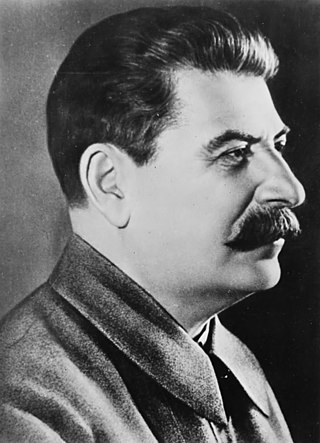
Stalinism is the means of governing and Marxist-Leninist policies implemented in the Soviet Union from 1927 to 1953 by Joseph Stalin. It included the creation of a one-party totalitarian police state, rapid industrialization, the theory of socialism in one country, collectivization of agriculture, intensification of class conflict, a cult of personality, and subordination of the interests of foreign communist parties to those of the Communist Party of the Soviet Union, deemed by Stalinism to be the leading vanguard party of communist revolution at the time. After Stalin's death and the Khrushchev thaw, de-Stalinization began in the 1950s and 1960s, which caused the influence of Stalin’s ideology begin to wane in the USSR. The second wave of de-Stalinization started during Mikhail Gorbachev’s Soviet Glasnost.

Totalitarianism is a form of government and a political system that prohibits all opposition parties, outlaws individual and group opposition to the state and its claims, and exercises an extremely high if not complete degree of control and regulation over public and private life. It is regarded as the most extreme and complete form of authoritarianism. In totalitarian states, political power is often held by autocrats, such as dictators and absolute monarchs, who employ all-encompassing campaigns in which propaganda is broadcast by state-controlled mass media in order to control the citizenry. By 1950, the term and concept of totalitarianism entered mainstream Western political discourse. Furthermore this era also saw anti-communist and McCarthyist political movements intensify and use the concept of totalitarianism as a tool to convert pre-World War II anti-fascism into Cold War anti-communism.
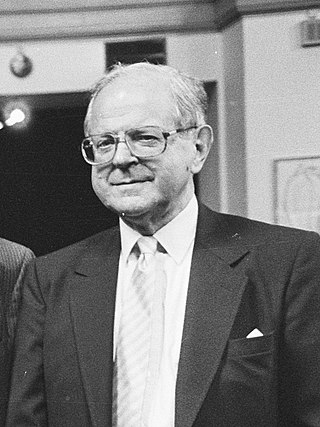
George Robert Acworth Conquest was a British historian and poet.

The Great Purge or the Great Terror, also known as the Year of '37 and the Yezhovshchina, was Soviet General Secretary Joseph Stalin's campaign to solidify his power over the party and the state; the purges were also designed to remove the remaining influence of Leon Trotsky as well as other prominent political rivals within the party. It occurred from August 1936 to March 1938.
The history of the Soviet Union between 1927 and 1953 covers the period in Soviet history from the establishment of Stalinism through victory in the Second World War and down to the death of Joseph Stalin in 1953. Stalin sought to destroy his enemies while transforming Soviet society with central planning, in particular through the forced collectivization of agriculture and rapid development of heavy industry. Stalin consolidated his power within the party and the state and fostered an extensive cult of personality. Soviet secret-police and the mass-mobilization of the Communist Party served as Stalin's major tools in molding Soviet society. Stalin's methods in achieving his goals, which included party purges, political repression of the general population, and forced collectivization, led to millions of deaths: in Gulag labor camps and during famine.

Andrei Aleksandrovich Zhdanov was a Soviet politician and cultural ideologist. After World War II, Zhdanov was thought to be the successor-in-waiting to Joseph Stalin but died before him. He has been described as the "propagandist-in-chief" of the Soviet Union from 1945 to 1948.
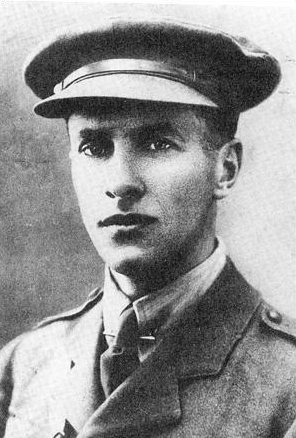
Walter Duranty was an Anglo-American journalist who served as Moscow bureau chief of The New York Times for fourteen years (1922–1936) following the Bolshevik victory in the Russian Civil War (1918–1921).

The Soviet Union introduced the collectivization of its agricultural sector between 1928 and 1940 during the ascension of Joseph Stalin. It began during and was part of the first five-year plan. The policy aimed to integrate individual landholdings and labour into collectively-controlled and state-controlled farms: Kolkhozes and Sovkhozes accordingly. The Soviet leadership confidently expected that the replacement of individual peasant farms by collective ones would immediately increase the food supply for the urban population, the supply of raw materials for the processing industry, and agricultural exports via state-imposed quotas on individuals working on collective farms. Planners regarded collectivization as the solution to the crisis of agricultural distribution that had developed from 1927. This problem became more acute as the Soviet Union pressed ahead with its ambitious industrialization program, meaning that more food needed to be produced to keep up with urban demand.
Soviet and communist studies, or Soviet studies is the field of historical studies of the Soviet Union and other Communist states as well as historical studies of the Communist parties that existed or still exist in some form in many countries, both inside and outside the former Eastern Bloc, such as the Communist Party USA. Aspects of its historiography have attracted debates between historians on topics including totalitarianism and Cold War espionage.
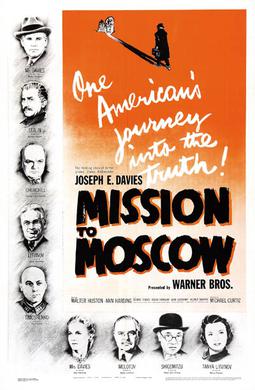
Mission to Moscow is a 1943 film directed by Michael Curtiz, based on the 1941 book by the former U.S. ambassador to the Soviet Union, Joseph E. Davies.
Throughout the history of the Soviet Union, tens of millions of people suffered political repression, which was an instrument of the state since the October Revolution. It culminated during the Stalin era, then declined, but it continued to exist during the "Khrushchev Thaw", followed by increased persecution of Soviet dissidents during the Brezhnev era, and it did not cease to exist until late in Mikhail Gorbachev's rule when it was ended in keeping with his policies of glasnost and perestroika.
Kremlinology is the study and analysis of the politics and policies of the Soviet Union while Sovietology is the study of politics and policies of both the Soviet Union and former communist states more generally. These two terms were synonymous until the dissolution of the Soviet Union. In popular culture, the term is sometimes used to mean any attempt to understand a secretive organization or process, such as plans for upcoming products or events, by interpreting indirect clues.

Gabriel Gorodetsky is a Quondam Fellow of All Souls College, Oxford, and emeritus professor of history at Tel Aviv University. Gorodetsky studied History and Russian Studies at the Hebrew University in Jerusalem and went on to obtain his Ph.D degree under the supervision of British historian E. H. Carr in Oxford. He was the director of the Cummings Center for Russian Studies at Tel Aviv University from 1991–2007. He has been a visiting fellow of St. Antony's College in Oxford in 1979 and in 1993, of the Woodrow Wilson International Center for Scholars in Washington in 1986, of All Souls in Oxford in 2006, and a visiting scholar at the Institute for Advanced Study in Princeton. Gorodetsky was also a visiting professor at the universities of Munich and Cologne, and at the Central European University in Budapest. In 2010 Gorodetsky received an honorary doctorate from the Russian State University for the Humanities in Moscow.
John Archibald Getty III is an American historian and professor at the University of California, Los Angeles (UCLA), specializing in the history of Russia and the history of the Soviet Union.
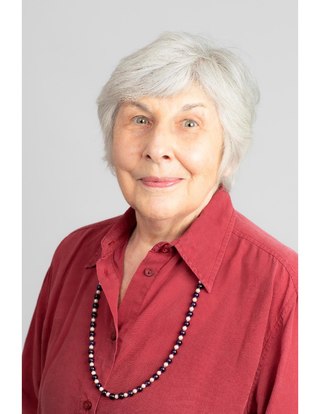
Sheila May Fitzpatrick is an Australian historian, whose main subjects are history of the Soviet Union and history of modern Russia, especially the Stalin era and the Great Purges, of which she proposes a "history from below", and is part of the "revisionist school" of Communist historiography. She has also critically reviewed the concept of totalitarianism and highlighted the differences between Nazi Germany and the Soviet Union in debates about comparison of Nazism and Stalinism.

Holodomor denial is the claim that the Holodomor, a large-scale, man-made famine in Soviet Ukraine from 1932–1933, did not occur. Officially, the Soviet Union denied the famine and suppressed information about it from its very beginning until the 1980s. This was also circulated by some Western journalists and intellectuals. It was echoed at the time of the famine by some prominent Western journalists, including The New York Times' Walter Duranty.

Joseph Stalin's cult of personality became a prominent feature of Soviet popular culture in 1929, after a lavish celebration of his purported 50th birthday. For the rest of Stalin's rule, the Soviet press presented Stalin as an all-powerful, all-knowing leader, with Stalin's name and image appearing everywhere. Historian Archie Brown sets the celebration of Stalin's 50th birthday on 21 December 1929 as the starting point for his cult of personality.
Paul Roderick Gregory is a professor of economics at the University of Houston, Texas, a research fellow at the Hoover Institution and a research fellow at the German Institute for Economic Research. He has written about Russia and the Soviet Union.

The Harvest of Sorrow: Soviet Collectivization and the Terror-Famine is a 1986 book by British historian Robert Conquest published by the Oxford University Press. It was written with the assistance of historian James Mace, a junior fellow at the Harvard Ukrainian Research Institute, who started doing research for the book following the advice of the director of the institute. Conquest wrote the book in order "to register in the public consciousness of the West a knowledge of and feeling for major events, involving millions of people and millions of deaths, which took place within living memory."
This is a select bibliography of post World War II English language books and journal articles about Stalinism and the Stalinist era of Soviet history. Book entries have references to journal reviews about them when helpful and available. Additional bibliographies can be found in many of the book-length works listed below.










